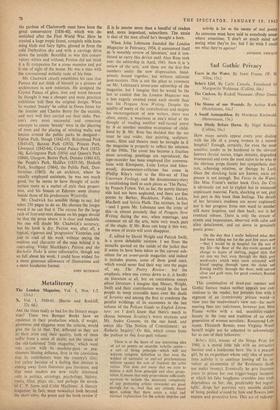Metaliterary
X, Vol. 1, 1960-61. (Barrie and Rockliff, 32s. 6d.)
ARE the times really so bad for the literary maga- zine? These two Bumper Books have an opulence in their production which, if weight, glossiness and elegance were the criteria, would give the lie to that. Yet, different as they are in their aims and. their quality, both of them suffer from a sense of strain; not the strain of the old-fashioned 'little magazine,' which went into action with its machine-guns or pea- shooters blazing defiance, firm in the conviction that its contributors were the country's elite; but rather because of a feeling that interest is ebbing away from literature qua literature, and that most readers are now really interested only in politics, sociology, psychology, history, opera, films, plays, etc., and perhaps the novels of C. P. Snow and Colin MacInnes. A literary magazine, in fact, must nowadays look beyond the short story, the poem and the book review if if is fo muster more than a handful of readers and, more important, subscribers. The strain is that of the man afraid he's thought a bore.
When John Lehmann founded the London Magazine in February, 1954, it announced itself
as `a monthly review of literature,' and it con- tinued to carry this device until Alan Ross took over the editorship in April, 1961. Now it is 'a review of the arts,' and these are the first five numbers under the new dispensation, hand- somely bound together, but without editorial post-mortem. This is not the place to comment on Mr. Lehmann's seven-year editorship of the magazine, but I imagine that he would be the last to contest that his London Magazine was a less eagerly awaited event each month than was his Penguin New Writing. Despite the quality of many of the contributions and despite his encouragement of new writers, there was often, surely, a weariness in one's mind at the thought of reading another well-turned poem by A or another sensitive re-creation of. child- hood by B. Mr. Ross has decided that the net must be cast wider, that painting, sculpture, music, films and theatre must be brought in if the magazine is properly to reflect the interests of the 1960s. The cover has become a fraction more arresting, paintings are reproduced, the tape-recorder has been employed (for conversa- tions with Klemperer, Lotte Lenya and Isher- wood), documentary-criticism has come in (Phillip Riley's visit to the film-set of That Uncertain Feeling), and the documentary-story is establishing itself in such pieces as 'The Paras,' by Francis Fytton. Yet, so far, the purely literary side had not been neglected, and there are fine poems by Barker, Blackburn, Fuller, Larkin, MacBeth and Sylvia Plath. The mixture, in fact —and I guess Mr. Lehmann sees the irony of this—is almost precisely that of Penguin New Writing during the war, when reportage, and comment on all the arts, were very much part of the staple. If Mr. Ross can keep it this way, the sense of strain will soon disappear.
X, edited by David Wright and Patrick Swift, is a more debatable mixture. I see from the remarks quoted on the inside of the jacket that it seems to have been taken as the current sub- stitute for an avant-garde magazine, and indeed it includes poems, some of them good ones, which would never find their way into the pages of, say, The Poetry Review: but the emphasis, when one comes down to it, is hardly on literature at all, but on contentious essays about literature. I imagine that Messrs.. Wright, Swift and their contributors would be the last people to weep crocodile tears over the death of Scrutiny and among the first to condemn the painful writhings of its successors in the last volume of the Pelican Guide to English Litera- ture; yet I don't know that there's much to choose between Scrutiny's worst excesses and Mr. Andor Gomme, on the one hand, and essays like The Notion of Commitment: an /Esthetic Inquiry.' Or this, which comes from the preface to this four-part volume :
There is at the heart of any interesting idea of art or poetry an anarchic volatile centre— a sort of living principle—which will not tolerate categoric definition so that even the wildest of surrealist or anti-art proclamations militate against the sort of freedom the artist values. This does not mean that we exist to initiate a drift from principle and clear propo- sition. It means that only propositions sufficiently accurate to include the necessary complexity of any interesting artistic viewpoint are good enough for us. And that any attitude based upon notion that there exists a total and rational explanation for the artistic impulse and
activity is for us the enemy of real poetry. As someone must have said to somebody some where sometime, `I don't so much mind not seeing what they're for, but I do wish I could see what they're against.'
ANTHONY IHWAlIt


































 Previous page
Previous page